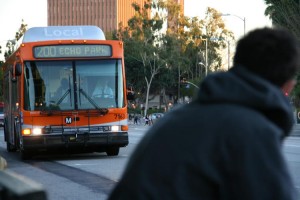GPSS to introduce subsidized transit program
The Graduate and Professional Student Senate is implementing a subsidized transit program for Fall 2011 that will reduce the cost of Metro passes for graduate students.
The program will allow graduate students to receive a discounted price for public transportation. Previously, students paid $32 per month, but now it will be $8.63 per semester.

Waiting ·A student waits at the bus stop at the intersection of 32nd and Hoover streets. Metro will now give graduate students a discounted pass. - Matthew Wunderlich | Daily Trojan
The idea for this program first began in Fall 2009 at a Campus Affairs committee meeting, where GPSS discussed the difficulty students had receiving passes from Metro.
In February 2010, GPSS representatives met with UCLA’s transportation committee to discuss ideas for a subsidized transit program.
“UCLA has a program like this that has been working for them. We wanted to talk to them and see how they had done it,” said Jenny Novak, president of GPSS.
The transportation committee learned through a survey of 987 graduate students and 12 undergraduate students, that 33.43 percent drive alone to campus, 18.95 percent use public transportation, 3.55 percent carpool, 21.48 percent ride bikes, 18.14 percent walk and 3.44 percent find other means of transportation.
Of the students surveyed, 73.96 percent said they would purchase a discounted Metro card at USC.
Based on the ridership at USC, Metro agreed to lower the student rate for graduate students because it is a profit-neutral number for them. With this new program, graduate students will only need to verify their enrollment at certain on-campus locations, the specifics of which have not been announced yet.
Not only will this new program make the process of receiving a Metro pass more efficient, it will also give students another option for transportation.
“Hopefully people not thinking about using buses before will start thinking of public transportation as a new and better option,” said Mary Kuhn, a graduate student studying urban planning and development who worked on the committee that met with Metro.
Keith Henkel, a graduate student studying biomedical engineering, said he wishes the Metro pass had become available earlier.
“I live right by a bus stop, and I have to pay a lot driving back and forth to campus, plus parking is always hard to find,” Henkel said. “For $8 a semester, I would have been on the bus all the time.”
This program, however, is only available for the graduate students at USC and not the undergraduate population.
Undergraduates will still have to pay $32 per month for a Metro card if they choose to buy one and will have to send their applications to Metro to be approved for a pass.
Although there have been no formal plans to continue the subsidized transit program with the undergraduate population, Kuhn said USG is looking into the possibility to expanding the program to include undergraduates.
“We want to roll the [Metro] program out to the whole school eventually,” Kuhn said. “USG has been supportive of our program and is interested in implementing it for the undergraduate students at some point.”
USG President Chris Cheng, said USG is busy working on other programs that are costly, and a subsidized transit program is not as essential for undergraduate students who tend to live on or near campus.
“If we were to implement the subsidized transit program, that money would go out of the mandatory fees that everyone pays,” Cheng said. “We want to make sure that the money students pay gets back to them and they get what they’re paying for. If not all the students are using public transportation, then we want to use the money for something that is useful to them.”

I would like it on the record that I do not ride buses.
I ride the Metro almost weekly to get off campus. I wish I could pay $1.60 per month (versus the undergraduate alternative of $32 per month, in which case a pass may cost more than not having a pass.)